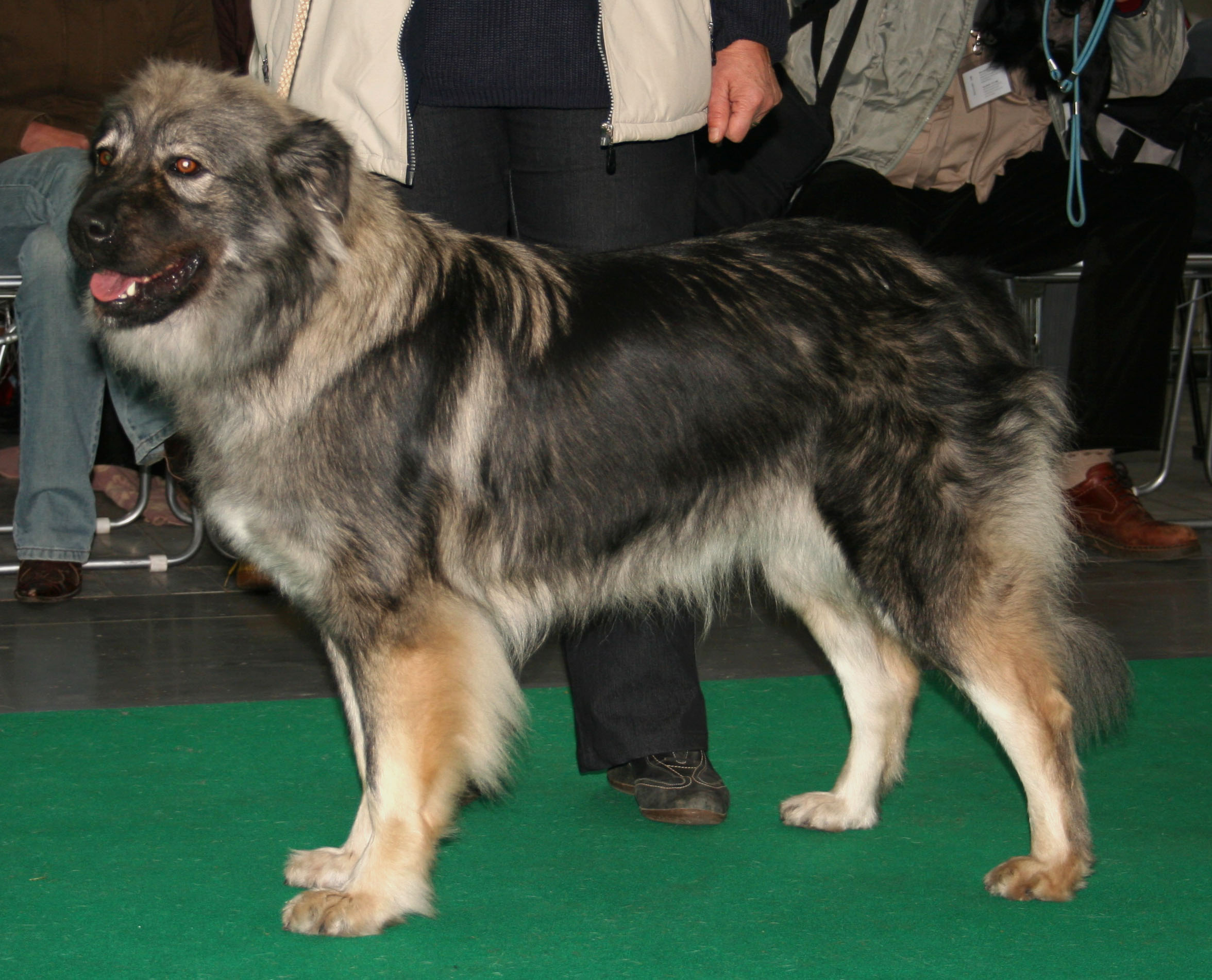- Krasky Ovcar
Infobox Dogbreed

image_caption =
name = Kraški ovčar
Karst Shepherd Dog
altname = Karst Shepherd, Owczarek Kraski
country =
fcigroup = 2
fcisection = 2.2 Molossoid breeds-Mountain type
fcinum = 278
fcistd = http://www.fci.be/uploaded_files/278gb2001_en.doc
akcgroup=
akcstd=
ankcgroup=
ankcstd=
ckcgroup=
ckcstd=
kcgroup =
kcukstd =
nzgroup =
nzkcstd=
ukcgroup =Guardian Dog Group
ukcstd =http://www.ukcdogs.com/WebSite.nsf/Breeds/KraskyOvcar
akcfss=
akcmisc =
ckcmisc =
notrecognized=
note = The United Kennel Club (US) uses the Fédération Cynologique Internationale standard.The Kraški ovčar (Karst Shepherd Dog) is a breed of
dog of the livestock guardian type, originating in what is todaySlovenia . The breed is recognised under sponsorship from Slovenia by the Fédération Cynologique Internationale with the name Kraški ovčar. The many ways of writing the name in English may imply that there are many breeds, but there is only one.Appearance
The Kraški ovčar (Karst Shepherd Dog) is a large dog with long, thick, shaggy iron grey coat. Ears are drop and the tail is held low, and there is a dark mask on the face.
Height at the
withers for dogs is 57 to 63 cms with an ideal size of 60 cms (23.6 ins), and weight is 30 to 42 kgs (66 to 92.4 lbs). Females are 54 to 60 cms with an ideal size of 57 cms (22.4 ins), and a weight of 25 to 37 kg (55 to 81.4 lbs).Temperament
The breed standard describes the dog as having a sharp temperament and strong individuality, distrustful of strangers. A good guard dog. Like all large dogs, the Kraški ovčar needs to be well socialized while very young, with people if the dog is to be a companion, and with livestock if the dog is to be a guardian. If the breed's background is taken into consideration, and if the dog is well socialized and trained, he may make a good family dog. Temperament of individual dogs may vary.
History
The Kraški ovčar (Karst Shepherd Dog) is named after an area of
karst (kras in Slovenian) landscape in Slovenia, Italy, Croatia and partly in Bosnia and Herzegovina, theGulf of Trieste to theDinaric Alps . The ancestral type of the modern day breed travelled with shepherds through this area, and most likely came with ancient nomadic pastoralists. In 1689 the BaronJanez Vajkard Valvasor mentioned the shepherd's dogs of the area in his writing about Slovenia. In the 20th century, when thelandrace shepherd dogs began to be documented as a modern breed, it was first referred to as theIllyrian Shepherd (1939); but in 1956 the Illyrian Shepherd became two breeds, the Kraški ovčar and theŠarplaninac . [ [http://www.fci.be/uploaded_files/278gb2001_en.doc Brief Historical Summary, breed standard (DOC file)] ]The breed is recognised by the Slovenian Kennel Club as a "Slovene Natural Treasure" and the oldest indigenous breed. [ [http://www.kinoloska-zveza.si/en/avtohtone-pasme/kraski-ovcar/ The Karst Shepherd, Slovenian Kennel Club (in English)] ] The [Fédération Cynologique Internationale] recognises the breed in Group 2, Section 2.2 Molossoid breeds-Mountain type, number 278. [ [http://www.fci.be/nomenclatures_detail.asp?lang=en&file=group2 Fédération Cynologique Internationale Group 2 (in English)] ] The breed has also been exported to the United States, where it is recognised by The
United Kennel Club in theGuardian Dog Group . The breed is also recognised by various minor kennel clubs and internet-based dog registry businesses, and is promoted as a rare breed for those seeking a unique pet.Health
If bred to be very oversize,
hip dysplasia may be a problem.ee also
*
The Glory of the Duchy of Carniola References
External links
* [http://www.kinoloska-zveza.si/en/ The Slovenian Kennel Club]
Wikimedia Foundation. 2010.
